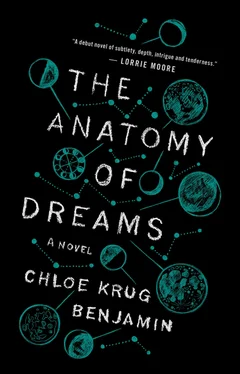By the time I walked into Keller’s office, half an hour had passed. I expected them to ask what had taken me so long, but Keller sat at his desk, finishing the summary report as usual. Gabe was on the floor, eating the last of his sandwich.
“Come back in six months?” I asked.
My voice was quiet, but I’d gotten their attention. Keller turned around in his chair, the wheels squealing on the floor.
“Is that a problem?” he asked.
“We just saw how damaged he is,” I said. “We watched him try to claw his way out of bed, we shocked him—and now we’re just going to send him home?”
I felt short of breath; I had never spoken to Keller this way before. I suppose I was worried he’d fire me. But a part of me knew that would be impossible for him, and that’s where I found my nerve.
“Sylvie,” said Keller, “the procedure tonight was no different than it is on any other night.”
“But on the other nights we were using adults. Teenagers, even.”
“We don’t use them,” said Keller. “We accept them as participants.”
I inhaled sharply, sucking in my mistake.
“We were accepting adults,” I said. “Not children. Jamie’s so vulnerable—his dreams are horrific. And we’re going to leave him like that?”
Keller looked at me closely, his hands crossed in his lap.
“Lucidity is the most basic demand of this study,” he said. “We make it very clear that every patient must meet the same requirement: if they aren’t dreaming lucidly within eight weeks, they can’t continue. No exceptions. Jamie didn’t qualify.”
“But that means we just lance the wound and leave it open. We help our patients remember what they’re dreaming, we intensify their experience of those dreams, and then we leave them behind if they don’t make the cut?”
“I don’t understand why you find this so disturbing.” Keller spoke clinically, his hands crossed in his lap. “You’ve watched me release a number of patients early. You weren’t bothered by them.”
“Maybe it’s because Jamie’s a kid.” I felt checked and defensive. “He’s so impressionable, and he’s experienced more trauma than most adults. Besides, he’s in danger—if we hadn’t been here, he would have gotten out of bed and followed his parents right out of the window. He could have hurt himself.”
“No, he couldn’t have,” said Gabe. “The window is barred.”
I stared at him, wounded; I’d expected him to be on my side.
“Here it is,” I said. “Not at home.”
Keller eyed us briefly. Then he picked up the notepad on his desk and began to read aloud, Gabe transcribing the notes on his laptop.
“Patient three oh four, age seven, fifty inches tall, forty-eight pounds, came to the lab for his lucidity assessment following a diagnosis of night terrors and/or somnambulism. In one single-night study, patient three oh four exhibited a characteristic lack of paralysis, but he did not meet standards for lucidity. While claiming the presence of a female intruder, patient three oh four exhibited violent behavior—”
“Exactly,” I said.
“—exhibited violent behavior,” Keller said, continuing, “which included talking, yelling, punching, kicking, turning the head rapidly from side to side, attempting to escape his constraints—”
“Do you really think we have no obligation to help him?” My body was shot through with heat. “Who knows what’ll happen in the next six months?”
Keller sighed. He set the pad on his lap and looked at me with a parent’s tired patience.
“The focus of our research,” he said, “is lucidity. Our studies are short-term; our goal is the resolution of abnormal behavior during sleep. Yes, we want to encourage self-awareness. Yes, we hope that lucid dreaming will ultimately lead to deeper understanding and reduced anxiety, but we can’t guarantee it. It’s never been within our purview to meet those particular endpoints—we don’t have the funding to keep a psychoanalyst on hand, which is exactly why I always suggest that patients follow up with a mental health professional in their area. We make recommendations; that’s the best we can do.”
He took off his glasses and squeezed the bridge of his nose with his thumb and forefinger, his eyes shut. When he opened them again, they were kinder.
“You feel pity for him,” he said. “Not surprising, given what he’s undergone—and it is horrifying, Sylvie; nobody is denying that. But you must remember that you’re a researcher. Our loyalty is to the research, not to any particular participant. If we doubted our work simply because it was occasionally unpleasant —if we braked whenever we felt badly for someone—”
“We’d be shit scientists,” said Gabe.
He laughed, and Keller smiled indulgently before looking up at me again.
“You’re right,” he said. “Our patients aren’t happy people. They’ve all experienced some sort of trauma, and that’s exactly why they’ve come to us. It isn’t always a pretty process. But we can’t play God.”
It sounded right, and I could poke no holes in it. What was rightness, I thought, if not impenetrability?
“Sylvie,” said Keller as I turned toward the door. “I shouldn’t have had you send the shocks. I was wrong, and I apologize. It was too much responsibility for you. I should have done it myself.”
I was quiet on the car ride home, eating the sandwich crusts that Gabe had saved for me as blood came back to my hands. When I finished, I put my palm on the back of Gabe’s neck out of habit, but it felt like there was a long corridor between us. I didn’t tell him about the sensation in my hands or the strange wash of heat, which hadn’t happened since high school. We got ready for bed without speaking and fell raggedly asleep. In the very early morning—it couldn’t have been later than four o’clock, the sky still dark—I began to shudder.
“Sylvie,” Gabe whispered, wrapping his body around mine. “Oh, Sylvie. It was a hard night for you, wasn’t it?”
I was embarrassed to find myself crying.
“I thought you would have agreed with me,” I said.
“I did agree with you. I do.”
“Then why didn’t you say so to Keller?”
“Because I agree with him, too. I agree with both of you.” He smoothed my hair back, tucking it behind my ears.
“Jamie reminded me of Anne,” I said.
Gabe stiffened, his hand pausing on my neck. “How?”
“I don’t know.” I felt like I had said something bad, something I wasn’t supposed to admit. “Because they both turned out wrong.”
Gabe hesitated.
“You’re sweating,” he said.
“Maybe I should shower.” My entire body was sticky.
“Don’t be ridiculous,” said Gabe. His voice had turned soothing again, a low hum, and I sank into it. “Go back to sleep. I don’t mind it.”
He pressed his cheek to mine, his ear against my ear.
“We didn’t hurt the boy,” he said. “We only woke him up.”
By the time I opened my eyes, it was almost nine, and the heat had left my body: my clothes were dry, and so was my skin. Gabe was still asleep. It was only a small scratch on his eyelid—pale as a white tattoo, a child’s scratch, the skin barely broken—that made me sure the previous night had happened at all.
7. BERKELEY, CALIFORNIA, 2002
By the time Gabe turned up in the coffee shop by my apartment, a week after the incident at Stinson Beach with David, I was almost expecting him. He sat at a small, narrow table, eating a biscotti and glancing around the coffee shop as though he were any other college student. There was a small yellow notebook on the table in front of him, but he wasn’t writing in it. At one point, he leaned down to fit a sugar packet underneath the rickety table stand. When he sat up again, I got up from my table and walked over to his.
Читать дальше












